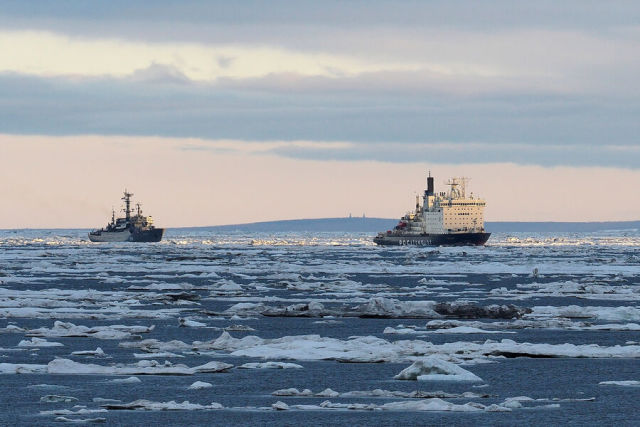NATO Admiral Bauer assessed the risk of conflict in the Arctic due to the friendship of Russia and China
Cooperation between Russia and China increases the likelihood of a conflict with NATO in the Arctic, said Admiral Bauer of the North Atlantic Alliance. According to him, the military bloc is particularly worried about China's shipping along the Russian Northern Sea Route. Russia, as the admiral noted, is also developing Arctic air bases. Details are in the material of "Gazeta.Ru».
Conflict in the Arctic
The chairman of the NATO military committee, Admiral Rob Bauer, warned that a conflict could flare up in the Arctic because of friendly relations between Russia and China.
As the admiral said in an interview with Bloomberg, the military bloc is concerned about the likelihood that Chinese commercial and scientific interests may become a precursor to the Chinese military presence in the Arctic. The alliance is also worried about China's shipping along the Russian Northern Sea Route.
In addition, according to him, the Chinese have organized a new route for their container ships to the Baltic Sea, which pass through the Northern Sea Route. Bauer stressed that one should not be naive and think that these routes are used only by commercial vessels from China.
As the military noted, the partnership between Beijing and Moscow in the field of energy and transport has led to a sharp increase in Russian oil supplies to China through Arctic waters. Strengthening Russian-Chinese relations could shake global stability, he said.
Russia in the Arctic
Moscow, as the NATO Admiral stressed, invests significant money in Arctic air bases and other infrastructure of the region.
Moscow has never hidden its efforts to develop the Arctic region. Russian President Vladimir Putin on September 12 at the Eastern Economic Forum called the development of the Arctic a strategic priority of Russia along with the development of the Far East.
In the second half of July, the Russian leader stated that the communal infrastructure and housing stock were worn out in the cities of the Arctic. Then he linked the improvement of settlements in the Arctic zone with the solution of defense issues.
Reasons for conflict
The possible conflict between Russia and NATO in the Arctic has been talked about for years. The reasons are called very different. In August last year, NATO Secretary General Jens Stoltenberg made a statement about the intensification of Russia and China's actions in the Arctic, in connection with which he called for strengthening the alliance's presence in the region.
In May, Bloomberg named the Arctic, rich in natural resources, as the next region of confrontation between Russia and Western countries. Experts interviewed by the publication named scientific developments, climate change, and the struggle for resources among the reasons for the confrontation.
Russian Foreign Minister Sergei Lavrov in June announced Russia's intention to respond to attempts by NATO countries to extend their influence to the Arctic.
Geographically, there are eight countries in the Arctic region: Russia, the USA, Norway, Canada, Denmark, Sweden, Finland and Iceland. The Russian Arctic territory, which is approximately 3 million square kilometers (18% of the total area of Russia), is home to 2.4 million people.
Anastasia Novikova

